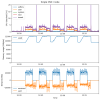Current fast SSD disks provide great performance, and fast network cards are becoming more affordable. Hence, this is a good point to reevaluate how quickly different network setups for Ceph can be saturated depending on how many OSDs are present in each node.
This benchmark presents possible setups and their performance outcomes, with the intention of supporting Proxmox VE users in making better hardware purchasing decisions.
The hardware used for the benchmarks was a Proxmox VE Ceph HCI (RI2112) 3-node cluster assembled by Thomas Krenn, a leading European manufacturer of customized server and storage systems.
Download PDF
Proxmox VE Ceph Benchmark 2023/12
Benchmarks from 2020
https://forum.proxmox.com/threads/proxmox-ve-ceph-benchmark-2020-09-hyper-converged-with-nvme.76516/
Benchmarks from 2018
https://forum.proxmox.com/threads/proxmox-ve-ceph-benchmark-2018-02.41761/
__________________
Best regards,
Martin Maurer
Proxmox VE project leader
This benchmark presents possible setups and their performance outcomes, with the intention of supporting Proxmox VE users in making better hardware purchasing decisions.
The hardware used for the benchmarks was a Proxmox VE Ceph HCI (RI2112) 3-node cluster assembled by Thomas Krenn, a leading European manufacturer of customized server and storage systems.
Download PDF
Proxmox VE Ceph Benchmark 2023/12
Benchmarks from 2020
https://forum.proxmox.com/threads/proxmox-ve-ceph-benchmark-2020-09-hyper-converged-with-nvme.76516/
Benchmarks from 2018
https://forum.proxmox.com/threads/proxmox-ve-ceph-benchmark-2018-02.41761/
__________________
Best regards,
Martin Maurer
Proxmox VE project leader



